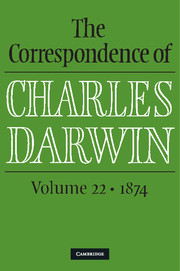Book contents
- Frontmatter
- Dedication
- Miscellaneous Frontmatter
- Contents
- List of illustrations
- List of letters
- Introduction
- Acknowledgments
- List of provenances
- Note on editorial policy
- Darwin/Wedgwood genealogy
- Abbreviations and symbols
- THE CORRESPONDENCE
- Appendixes
- I Translations
- II Chronology
- III Diplomas
- IV Presentation lists for Coral reefs 2d ed. and Descent 2d ed.
- V St G. J Mivart, G. H. Darwin, and the Quarterly Review
- Manuscript alterations and comments
- Biographical register and index to correspondents
- Bibliography
- Notes on manuscript sources
- Index
- Table of Relationship
V - St G. J Mivart, G. H. Darwin, and the Quarterly Review
from Appendixes
Published online by Cambridge University Press: 05 July 2018
- Frontmatter
- Dedication
- Miscellaneous Frontmatter
- Contents
- List of illustrations
- List of letters
- Introduction
- Acknowledgments
- List of provenances
- Note on editorial policy
- Darwin/Wedgwood genealogy
- Abbreviations and symbols
- THE CORRESPONDENCE
- Appendixes
- I Translations
- II Chronology
- III Diplomas
- IV Presentation lists for Coral reefs 2d ed. and Descent 2d ed.
- V St G. J Mivart, G. H. Darwin, and the Quarterly Review
- Manuscript alterations and comments
- Biographical register and index to correspondents
- Bibliography
- Notes on manuscript sources
- Index
- Table of Relationship
Summary
In 1874, St George Jackson Mivart caused Darwin and his son George serious offence. Mivart had previously been a correspondent of CD's, but had written hostile reviews of some of CD's work, as a result of which CD had brought their correspondence to an end. The dispute was not resolved until early 1875, and, even then, not to Darwin's complete satisfaction. The story sheds light on CD's anxiety about the respectability of his views and the views of those associated with him, his reluctance to enter a public debate, the fierce loyalty of his friends, and contemporary codes of behaviour in scientific society. It has been discussed in Gruber 1960, pp. 98–114, and Dawson 2007, pp. 77–81.
In August 1873, George had published an article under the title ‘On beneficial restrictions to liberty of marriage’ in the Contemporary Review (G. H. Darwin 1873b). In this article, George discussed how modern scientific doctrines might be expected in the future to affect personal liberty in the matter of marriage. A better understanding of the inheritance of mental and physical qualities would make people realise that their reproductive choices would have an effect on future society. Francis Galton had written about the possibility of creating an elite who would intermarry as a way of improving the race; George wanted to discuss the consequences of a scheme he thought more likely to be adopted, the prevention of marriage among inferior members of the race. Mental disease seemed to be increasing, and in his view was inheritable, and the most obvious way to deal with it was to introduce restrictions on marriage.
As a first step, he argued, a divorce should not be refused on the grounds of the insanity of either party. The next step would be that insanity should itself be grounds for divorce: ‘as … no slur would be cast on the character of either party, the divorce proceedings would lose much of their sting, and the patient, should he recover, would suffer in no other respect than does anyone, who is forced by ill-health to retire from any career which has been begun; although, of course, the necessary isolation of the parent from the children would be a peculiarly bitter blow’ (p. 418).
- Type
- Chapter
- Information
- The Correspondence of Charles Darwin , pp. 635 - 645Publisher: Cambridge University PressPrint publication year: 2015



